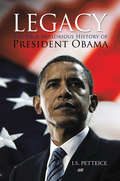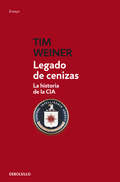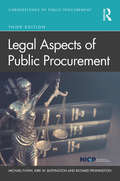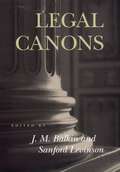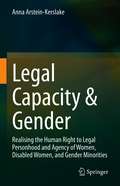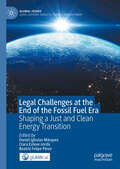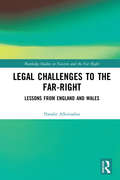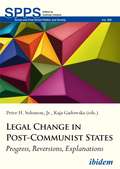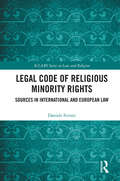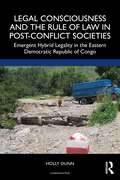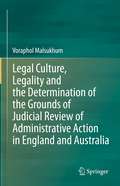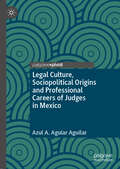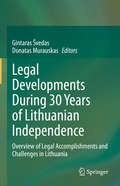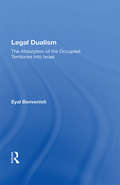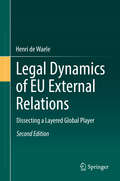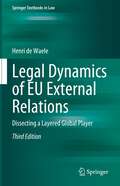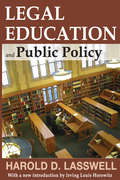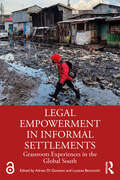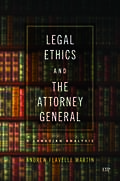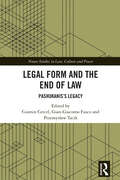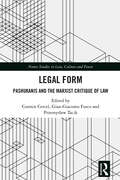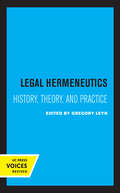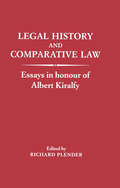- Table View
- List View
Legacy: The True Inglorious History of President Obama
by Petteice IreneA man with aspirations of being a world leader, Barack Obama, a man with many secrets of his own, set out to destroy the strongest power by bankrupting the nation, diminishing its military, and apologizing to all other countries for its arrogance. A man that has his own army and concentration camps ready at his whim for you. A man that could and should have brought unity between black and white America but his cause was to further his own agenda to take guns away from America and destroy its Second Amendment. Barack Obama, the man that said he was a Christian when everything he did pointed to the fact that he is a Muslim. Barack Hussein Obama, the man who will go down in the annals of history known as a Muslim, a Luminati, a member of the New Black Panthers, a member of the gay community, and as the worst President the United States of America has ever elected.
Legado de cenizas: La historia de la CIA
by Tim WeinerLa primera historia completa de la CIA. Durante los últimos sesenta años, la CIA ha conseguido mantener una excelente reputación a pesar de su terrible trayectoria, escondiendo sus errores en archivos de alto secreto. Ahora, Tim Weiner, ganador del Pulitzer por sus trabajos periodísticos sobre los servicios secretos estadounidenses, nos ofrece la historia definitiva de la CIA. A partir de más de cincuenta mil documentos y cientos de entrevistas, Legado de cenizas reconstruye la apasionante historia de la agencia secreta más famosa y temida del mundo, desde su creación tras la Segunda Guerra Mundial hasta el colapso del 11 de septiembre. Una obra fundamental para entender la segunda mitad del siglo xx. ** Ganador del National Book Award de no ficción. ** Mejor libro de historia de 2007 para Los Angeles Times. ** Finalista del National Book Critics Circle Award de no ficción Reseñas:«Sin este Legado de cenizas no se puede entender el siglo XX; seguramente, tampoco el siglo XXI.»El País «El relato trepidante y documentado de una realidad que supera a cualquier ficción.»ABC «Realmente extraordinario, el mejor libro que se ha escrito nunca sobre espionaje.»The Wall Street Journal «Magistral, un trabajo brillante.»Los Angeles Times «Apasionante, no deja cabos sueltos.»The New York Times «Un triunfo tanto del periodismo como de la historia.»Washington Post
Legal Aspects of Public Procurement (Cornerstones of Public Procurement)
by Michael Flynn Kirk W. Buffington Richard PenningtonLegal Aspects of Public Procurement, Third Edition provides a glimpse into the relationships between the legal, ethical, and professional standards of public procurement, outlining not only the interconnections of federal, state, and local law but also best practice under comprehensive judicial standards. The book addresses the ever-changing legal structures that work in conjunction and define the public procurement profession, providing recommended guidance for how practitioners can engage in the function while staying ethically aligned. Instead of trying to address every issue at the heart of public procurement, however, the book seeks to establish the history and spirit of the law, outlining how practitioners can engage proactively and willingly to not only perform their function, but to also become advocates for procurement law modernization. This third edition features new chapters on competitive sealed proposals and contract administration, as well as a thoroughly revised and updated chapter on procurement of information technology to better relate to an increasingly digital world. Promoting a start-to-finish guidance of the procurement process, Legal Aspects of Public Procurement explores the relationships between solicitation, proposals, contract administration, and the cutting-edge aspects of technology procurements, providing a theoretical and case-study driven foundation for novice and veteran practitioners alike.
Legal Canons
by J. M. Balkin & Sanford LevinsonEvery discipline has its canon: the set of standard texts, approaches, examples, and stories by which it is recognized and which its members repeatedly invoke and employ. Although the last twenty-five years have seen the influence of interdisciplinary approaches to legal studies expand, there has been little recent consideration of what is and what ought to be canonical in the study of law today. Legal Canons brings together fifteen essays which seek to map out the legal canon and the way in which law is taught today. In order to understand how the twin ideas of canons and canonicity operate in law, each essay focuses on a particular aspect, from contracts and constitutional law to questions of race and gender. The ascendance of law and economics, feminism, critical race theory, and gay legal studies, as well as the increasing influence of both rational-actor methodology and postmodernism, are all scrutinized by the leading scholars in the field. A timely and comprehensive volume, Legal Canons articulates the need for, and means to, opening the debate on canonicity in legal studies. Table of Contents
Legal Capacity & Gender: Realising the Human Right to Legal Personhood and Agency of Women, Disabled Women, and Gender Minorities
by Anna Arstein-KerslakeThis book is one of the first to explore legal capacity denial in relation to women, disabled women, and gender minorities. It discusses in depth the meaning of the right to legal capacity and its two core elements – legal personhood and legal agency. Using critical feminist, disability, and queer theory, it offers insights into the construction of legal personhood and its role as a predictor of power and privilege. The book also identifies patterns of oppression through legal capacity denial in various jurisdictions and discusses cases in which modern law continues to enforce these denials. Legal capacity is essential for an individual’s participation in society. It is required for voting, marrying, inheriting, contracting, consenting and other areas that are critical components of social structures and can be predictors of power and privilege. Historically, women have been denied legal capacity in many ways. For example, they have been denied legal capacity to vote, inherit, and contract – and some of these practices continue today. The legal capacity of disabled women is frequently denied through laws that deny decision-making on the basis of disability, such as guardianship, mental health laws and capacity to consent laws. In turn, the legal capacity of gender minorities is also denied in numerous ways – for example, in situations where government-issued identification, such as a passport, is required for the exercise of legal capacity but requires gender-binary identification. In these situations, it may be impossible or very dangerous for some gender minorities to acquire or use such identification – resulting in an inability to exercise their legal capacity. In these ways and many others, the intersection of disability and gender can result in multiple forms of marginalisation through legal capacity denial.The right to legal capacity has been protected in international human rights law since the 1960s. It is derived from the right to equal recognition before the law, which can be found in the 1966 International Covenant on Civil and Political Rights (ICCPR). It was reiterated in more detail in the 1979 Convention on the Elimination of Discrimination Against Women (CEDAW) and finally enumerated extensively in the 2006 Convention on the Rights of Persons with Disabilities (CRPD). Article 12 of the CRPD explicitly guarantees the right to legal capacity and establishes a state obligation to provide support for the exercise of legal capacity. This book argues that the right to legal capacity is a non-derogable civil and political right. It presents both a legal argument to support this, as well as a normative analysis of the importance of the right to legal capacity in maintaining equality in socio-legal systems. In addition, the book presents solutions: it identifies practices to learn from in various jurisdictions around the world – including both civil law and common law jurisdictions. It also uses case studies to illustrate the ways in which existing laws, policies and practices could be reformed. As such, the book offers both a novel contribution to the field of legal capacity law and a tool for creating change and helping to realise the right to legal capacity for all.
Legal Challenges at the End of the Fossil Fuel Era: Shaping a Just and Clean Energy Transition (Global Issues)
by Daniel Iglesias Márquez Clara Esteve-Jordà Beatriz Felipe PérezThis edited collection proposes a wide range of approaches to address the legal issues pertaining to the end of the fossil fuel era. While the fossil fuel era is coming to an end both because of the inherent limits of its resources and because of the need to prevent to further pump out CO2 in an already saturated atmosphere, the legal dispositions to ensure an ordered and rational shift toward cleaner energy still need to be developed. Not only in relation to CO2 emissions themselves but also in relation to the manifold issues related to environmental justice in an era of global climate change and global warming. This book is unique in that it provides a theoretical framework but also works to address cutting edge issues through a series of case studies.
Legal Challenges to the Far-Right: Lessons from England and Wales (Routledge Studies in Fascism and the Far Right)
by Natalie AlkiviadouThe work considers the international and European obligations of the UK in the realm of challenging the far-right and assesses the extent to which it adheres to them. It looks at the role of criminal law in tackling hate speech and hate crime and assesses how English law deals with political parties which may deviate from agreed norms and principles such as non-discrimination. The legal analysis is placed within a contextual framework of far-right parties in the United Kingdom and also incorporates a definitional framework in terms of how the law defines themes relevant to challenging the far-right, such as racial discrimination, terrorism and extremism. The book presents a valuable guide for students, academics and policy-makers in the areas of International Human Rights Law, Criminal Law, Comparative Constitutional Law, National Security Law, Comparative Politics and Terrorism Studies.
Legal Change in Post-Communist States: Progress, Reversions, Explanations (Soviet and Post-Soviet Politics and Society #208)
by Kaja GadowskaReformers had high hopes that the end of communism in Eastern Europe and the former Soviet Union would lead to significant improvements in legal institutions and the role of law in public administration. However, the cumulative experience of twenty-five years of legal change since communism has been mixed, marked by achievements and failures, advances and moves backward. This book—written by a team of socio-legal scholars—probes the nuances of this process and starts the process to explain them. It covers developments across the former Soviet Union and Eastern Europe, and it deals with both legal institutions (courts and police) and accountability to law in public aministration, including anticorruption activities. In explaining their findings, the authors probe the impact of such factors as the type of political regime (democratic to authoritarian), international influences (such as the European Union), and culture (legal and political). The volume’s contributors are: Mihaela Serban, Kim Lane Scheppele, Kriszta Kovacs, Alexei Trochev, Peter Solomon, Olga Semukhina, Maria Popova, Vincent Post. Marina Zaloznaya, William Reisinger, Vicki Hesli Claypool, Kaja Gadowska, and Elena Bogdanova.
Legal Code of Religious Minority Rights: Sources in International and European Law (ICLARS Series on Law and Religion)
by Daniele FerrariThis volume presents a systematic collection of the various international legal sources that define the rights of religious minorities.In a time of increasing tensions around religious minorities, this volume presents a systematic collection of international and European documents on the protection and promotion of religious minorities’ rights. The code includes documents from the United Nations, the Council of Europe, the Organization for Security and Cooperation in Europe and the European Union. An index system connects the various sources and norms, and emphasizes the strengths and the weaknesses in the legal frameworks of international and European institutions. While allowing for further research on the historical and conceptual development in the area, the code provides the reader with a new, easily accessible tool facilitating experts and actors who wish to improve the knowledge and protection of religious minorities. This book will be an invaluable resource for students, academics and researchers interested in law and religion, international law, public law and human rights law, the code is also a powerful tool for minorities themselves, and for advocates of their rights.
Legal Consciousness and the Rule of Law in Post-Conflict Societies: Emergent Hybrid Legality in the Eastern Democratic Republic of Congo
by Holly DunnThis book considers how legal reforms and awareness raising associated with building the rule of law have engaged the popular legal consciousness, producing contradictions that have in turn shaped the nature of the resultant legality. How are popular legal-justice beliefs and practices transformed when legal reforms encounter local contexts and cultures? For over a decade, scholars have engaged with the argument that legal reform through rule of law building is the answer to the various ills of countries transitioning from war to peace or authoritarianism to democracy. Yet, scholars have also repeatedly critiqued rule of law building projects: The rule of law, in theory and in practice, is a product of Western liberal thought and development and provides limited space for local culture, norms, and practices. This tension has been playing out in multiple locations, and in the Democratic Republic of Congo for about two decades. This book examines how rule of law reforms in the Democratic Republic of Congo shape local understandings and practices of law and justice. Instead of focusing on their so-called successes and failures, it explores popular legal consciousness – how people think about, perceive, and engage with the law – to draw broader conclusions about the practical, everyday outcomes of attempts to build the rule of law. This book will appeal to comparativists, Africanists, and socio-legal scholars who study post-conflict reconstruction, rule of law building, legal consciousness, access to justice and legal pluralism, as well as those with practical interests in these areas.
Legal Culture, Legality and the Determination of the Grounds of Judicial Review of Administrative Action in England and Australia
by Voraphol MalsukhumThis book presents a navigating framework of legal culture and legality to facilitate a comprehensive understanding of the English and Australian determination of the grounds of judicial review. This book facilitates tangible process of how and why jurisdictional error, jurisdictional fact, proportionality and substantive legitimate expectations are debatable in English law, while they are either completely rejected or firmly entrenched in Australian law. This book argues that these differences are not just random. Legality is not just a fig-leaf, but is profoundly rooted in legal systems’ legal culture; hence, it dictates the way in which courts empower, justify, constrain or limit the scope of judicial review. This book presents evidence that courts differ in legal systems and apply diverse ways to determine the scope of judicial review based on their deep understanding of legality, which is embedded in the legal culture of their legal system. This book uses comparative methodology and develops this framework between English and Australian law. Although obvious and important, this book presents a kind of examination that has never been undertaken in this depth and detail before.
Legal Culture, Sociopolitical Origins and Professional Careers of Judges in Mexico
by Azul A. Aguiar AguilarThis book explores the careers, professional trajectories and legal cultures of judges in the federal judiciary in Mexico. So far, there has been limited research on internal factors contributing to the understanding of judicial power dynamics in Mexico and other Latin American countries at large; this Work fills an important gap in the literature through its empirical investigation of internal legal cultures and judicial norms, offering new data, measurement strategies,and insights into the interactions between law, politics, norms, legal culture(s), as well as judicial behavior. Utilising an original survey, the chapters analyse judicial conceptualizations of role norms, legal cultures, proclivities for judicial activism, and judicial behavior. In so doing, this book contributes to understanding of underlying key internal factors of judicial activism or restraint, in turn moving forward the debate that seeks to explain judicial behavior reliant on internal and ideational perspectives. Complementing limited but existing studies of judicial politics in Mexico through its analysis of judges beyond those that sit at the Supreme Court, this book will be of particular interest to Latin-American judicial politics scholars due to its focus on the judicial power from internal perspectives as well as sub-national judges, filling a void in the literature vis-à-vis the study of courts in Latin America. This Work was originally written in Spanish, and the translation was done with the help of artificial intelligence. A subsequent human revision was done primarily in terms of content.
Legal Developments During 30 Years of Lithuanian Independence: Overview of Legal Accomplishments and Challenges in Lithuania
by Gintaras Švedas Donatas MurauskasThis volume provides an overview of selected major areas of legal and institutional development in Lithuania since the Restoration of Independence in 1990. The respective chapters discuss changes in fields varying from the constitutional framework to criminal law and procedure. The content highlights four major aspects of the fundamental changes that have affected the entire legal system: the Post-Soviet country’s complex historical heritage; socio-political and other conditions in the process of adopting new (rule of law) standards; international legal influences on the national legal order over the past 30 years; and finally, the search for entirely new national legal models.Over a period of 30 years since gaining its independence from the Soviet Union, Lithuania has undergone unique social changes. The state restarted its independent journey burdened by the complicated heritage of the Soviet legal system. Some major reforms have taken place swiftly, while others have required years of thorough analysis of societal needs and the search for optimal examples in other states. The legal system is now substantially different, with some elements being entirely new, and others adapted to present needs.
Legal Dualism: The Absorption Of The Occupied Territories Into Israel
by Eyal BenvenistiThis book examines the various methods by which Israeli law is being applied to the occupied territories and their inhabitants. It discusses the legal situation of the territories from the point of view of the positive law that is in effect there.
Legal Dynamics of EU External Relations
by Henri De WaeleLayered Global Player offers a concise but thorough overview of the principles of EU external relations law. By closely examining the role of the European Union on the global scene, it aims to provide a systematic overview of the relevant rules and competences, reflecting the legal developments in their historical and political context. The book contains up-to-date analyses of topics such as the Common Foreign and Security Policy, the Common Security and Defence Policy and the Common Commercial Policy. Moreover, it devotes specific attention to the EU's external powers with regard to the environment, fundamental human rights and development cooperation. It also includes a dedicated chapter exploring the relations with neighbouring countries, as well as one that elucidates the complex interplay between rules of domestic, European and international provenance. Overall, this book couples an innovative design with comprehensive coverage and an engaging style of writing. Its compactness and accessibility enable readers to master the main features of this dynamic field of law with ease, making it an indispensible resource for scholars and practitioners alike.
Legal Dynamics of EU External Relations: Dissecting a Layered Global Player (Springer Textbooks in Law)
by Henri de WaeleThis volume offers a concise yet thorough picture of the principles of EU external relations law. By carefully examining the role of the Union on the global scene, it aims to provide a systematic overview of the relevant rules and competences, reflecting on the legal developments in their political and societal context. The book contains up-to-date analyses of inter alia the Common Foreign and Security Policy, the Common Security and Defence Policy and the Common Commercial Policy. Moreover, it devotes specific attention to the EU's external powers as regard the environment, fundamental rights and development cooperation. In addition, it includes a dedicated chapter exploring the relations with neighbouring countries, as well as one that elucidates the complex interplay between rules of domestic, European and international provenance. One of the work’s key assets is how reflections on the law are interwoven with, and supplemented by, insights from adjacent disciplines like international studies, political science, and public administration. The third edition, like its predecessors, continues to have an undergraduate readership in mind. The inclusion of chapter overviews, clarifying boxes, and countless topical examples should prove extra enlightening for those audiences. The book managed to attract particular praise earlier for its lucid style and great accessibility. As before, its compact dimensions, transparent design and comprehensive approach should enable users to master the central features of this gripping field of law with ease. Newly appearing in the Springer Textbooks in Law series, it remains an invaluable resource for students and lecturers alike.
Legal Education and Public Policy
by Harold D. LasswellIn spite of a cascade of criticism launched against the social sciences, they have brought a qualitative improvement in method and theory to the study of human beings and human relations. In the process of developing now commonplace foundations of social research few individuals have exercised a greater role in justifying and enriching social scientific thought and practice than Harold D. Lasswell. Originally published in 1945 as The Analysis of Political Behaviour, this extraordinary volume has been re-titled Legal Education and Public Policy. The selections acknowledge Lasswell's growing anxieties about a world of revolution, violence, and terror, and the frailties of law in addressing such matters. That he did so without recourse to vague and fatuous appeals to world law and world order is an indication of how close to empirical realities he remained. Lasswell's essays fuse the legal and moral in the conduct of public policy. This did not deter him from arguing the case for and ultimate benefits of democratic values as a ground for legal thought. Lasswell singles out the interviewing technique of the psychiatrist, what he calls -the insight interview- in many of these essays. The Freudian world opened up the possibilities of analysis to political scientists who, prior to Lasswell, viewed neuroses in the leaders they studied but without normative points to measure their own biases. Lasswell's essays serve as a landmark in accelerating rapid advance in social science research. It allowed for the evolution of political behavior that has catapulted the field to a major dimension of political science studies in leadership and mass persuasion.
Legal Empowerment in Informal Settlements: Grassroots Experiences in the Global South
by Adrian Di GiovanniThis book investigates grassroots, community-led justice strategies – known as legal empowerment – being used to promote the human rights of people living in informal settlements in the Global South.Residents of informal settlements, also known as slums or favelas, encounter a complex array of human rights violations; from systemic discrimination by public officials, to threats to physical security from forced evictions, or arbitrary arrests, to a lack of access to basic services such as housing, water, sanitation, and education. This book shows how grassroots justice organizations around the world are working with residents to defend their rights and secure more dignified living conditions. Drawing on original empirical research across 10 countries in Africa, Asia, and Latin America, the book demonstrates how legal empowerment can put residents at the centre of holistic approaches to urban development and confront exclusionary and undemocratic systems of governance. The book encompasses practical recommendations and strategies such as rights-based approaches to informality, participation, community mobilization and litigation.Bridging the gaps between the law on the books and the harsh realities of informality on the ground, this book will be an important read for researchers, practitioners, and policymakers, working in realms of social and economic rights, access to justice and urban poverty and development.
Legal Ethics and the Attorney General: A Canadian Analysis
by Andrew Flavelle MartinIn Canada, the Attorney General holds a complex and unique role within the federal, provincial, and territorial governments. Despite this key position, there is relatively little knowledge and understanding of the role and professional responsibilities of the Attorney General among the public, the media, policymakers, and politicians – including at least some Attorney Generals themselves. Legal Ethics and the Attorney General adopts a doctrinal approach to examine and explain how legal ethics, and particularly the law of lawyering, applies to the Attorney General. The book illustrates that, while the role of the Attorney General is unique, the individual occupying this position practises law and should be held to the same standards as any other lawyer. It addresses common misconceptions: that the Attorney General is not truly a lawyer, that actions deemed wrongful for other lawyers may not be considered wrongful for the Attorney General, or that the accountability measures appropriate for lawyers do not apply to the Attorney General. Ultimately, Legal Ethics and the Attorney General reveals the importance of the accountability of the Attorney General, especially to the provincial and territorial law societies that serve as regulators of the legal profession. This accountability is essential not only for upholding the rule of law but also for enabling these societies to fulfil their statutory mandates to regulate the legal profession in the public interest.
Legal Form and the End of Law: Pashukanis's Legacy (Nomos Studies in Law, Culture and Power)
by Cosmin Cercel Przemysław Tacik Gian-Giacomo FuscoFollowing the 100th anniversary of Pashukanis’ General Theory of Law and Marxism (1924), this volume aims to breathe new life into the main category of Pashukanian legacy, the concept of legal form. This book offers new, deeper and more general, ways in which the concept of legal form can be used to push forward Marxist – post-Marxist or hauntingly Marxist – legal theory. Accordingly, this book does not pledge allegiance to reconstructing and reconsidering the official interpretative legacy of the legal form. Instead, it mobilises the revolutionary conceptual potentialities that this term contains. When investigated thoroughly, and in many dimensions, the legal form becomes a privileged vantage point not only into the greatest law-related riddles of Marxism (such as the relation between economy and the state or withering away of statal apparatuses), but the whole of modernity as the epoch determined by – if not overlapping with – capitalism. This book aims to think with the legal form rather than explain this concept. In so doing, it offers a panoply of theoretical perspectives that address legal subjectivity, abstraction, autonomy of the law and, last but not least, withering away of the law. This contemporary interrogation of the relevance of the concept of legal form will be of considerable interest to scholars and students of legal and political theory.
Legal Form: Pashukanis and the Marxist Critique of Law (Nomos Studies in Law, Culture and Power)
by Cosmin Cercel Przemysław Tacik Gian-Giacomo FuscoA century after the publication of Evgeny Pashukanis’ pivotal book General Theory of Law and Marxism, this collection presents a comprehensive account and analysis of his key concept of legal form.Evgeny Pashukanis’ General Theory, born amidst the fervour of the first socialist revolution, remains still a crucial reference point in Marxist theories of the law and critical legal theory. Its theoretical depth paved the way for new understandings of the relationship between Marxism and the law. Its crucial virtue continues to be, even after a century, the ability to articulate epochal concerns in the context of a socialist revolution that turned hitherto theoretical problems into dilemmas of practice. This book returns to Pashukanis’ main concept: ‘legal form’. Through this jurisprudential category Pashukanis aimed to grasp the dependence of the law on the economy, and at the same time, to enquire into the degree to which the law preserves its autonomy from economic relations. In other words, the legal form as a concept conveys both the law’s dependence on the economic sphere of exchange and its greatest inherent specificity: the way it translates economic relations into its proper language and set of legal/ideological constructs. The contributions to this volume provide a range of perspectives on how the concept of legal form has been developed and reinterpreted.Including the first English translation of Pashukanis’ essay, ‘Hegel, State and Law’, this collection will be of considerable interest to scholars and students of legal and political theory.
Legal Gladiator: The Life of Alan Dershowitz
by Solomon SchmidtThe only biography of America&’s most controversial lawyer.Legal Gladiator is the story of perhaps the greatest lawyer in American history. It is the story of a poor, failing high schooler from Brooklyn who became the youngest professor in the history of Harvard Law School, where Ted Cruz, Natalie Portman, Mike Pompeo, Jamie Raskin, and others sat under his tutelage. It is the story of a passionate Zionist who advocated for Israel on the world stage and became a confidant of Israeli prime ministers, including Benjamin Netanyahu. And it is the story of a zealous young liberal who, as an old man, stood in front of the Senate to declare that they would be violating the Constitution by removing a Republican president he himself opposed. As a lawyer, Alan Dershowitz has had a major impact on the most notorious legal cases in modern U.S. history. From Claus von Bulow to Mike Tyson to O.J. Simpson to Jeffrey Epstein to Donald Trump, he has devoted his life to championing the bedrock principle of the American justice system: that every person—no matter how despised—has the right to a rigorous legal defense. Legal Gladiator explores Dershowitz&’s rise to prominence, gives the inside story of his most high-profile cases and controversies, and provides a shockingly intimate look into his personal life. Dershowitz gave author Solomon Schmidt unprecedented access to his personal and professional life, including his private archives at Brooklyn College and dozens of interviews with him virtually and in New York City, Miami, Martha&’s Vineyard, and Israel. This book includes exclusive interview content from Bob Shapiro, Jeffrey Toobin, Israeli Prime Minister Ehud Olmert, Glenn Greenwald, Rep. Jamie Raskin, Eliot Spitzer, Justice Stephen Breyer, Mike Huckabee, Woody Allen, Noam Chomsky, Jared Kushner, Geraldo Rivera, Mark Levin, Mike Pompeo, Megyn Kelly, Mike Tyson, Ted Cruz, Robert F. Kennedy Jr., O.J. Simpson, and Donald Trump, among others.
Legal Guide for Lesbian & Gay Couples, A
by Emily Doskow Frederick HertzProtect yourself and your loved one with sound legal planning Gay and lesbian couples have gained a lot of legal ground in recent years. Although same-sex marriage is now legal across the U.S.,laws governing civil unions and domestic partnerships vary from state to state. So it's still important to define and protect your relationship in the eyes of the law--and A Legal Guide for Lesbian & Gay Couples can help. This plain-English guide shows you how to: structure your relationship with a contract jointly buy a house or other property make practical decisions about living together, marrying, or registering as legal partners make a will or living trust make medical decisions for each other if needed have and raise children through adoption, donors, surrogacy, or foster parenting, and deal with the end of a relationship. The 18th edition is completely revised to provide the latest on same-sex marriage, domestic partnerships, and civil unions, and new information regarding parentage laws. All forms are now downloadable via a special link at nolo.com.
Legal Hermeneutics: History, Theory, and Practice
by Gregory LeyhThis title is part of UC Press's Voices Revived program, which commemorates University of California Press’s mission to seek out and cultivate the brightest minds and give them voice, reach, and impact. Drawing on a backlist dating to 1893, Voices Revived makes high-quality, peer-reviewed scholarship accessible once again using print-on-demand technology. This title was originally published in 1992.
Legal History and Comparative Law: Essays in Honour of Albert Kilralfy
by Richard PlenderFirst Published in 1990. Routledge is an imprint of Taylor & Francis, an informa company.
